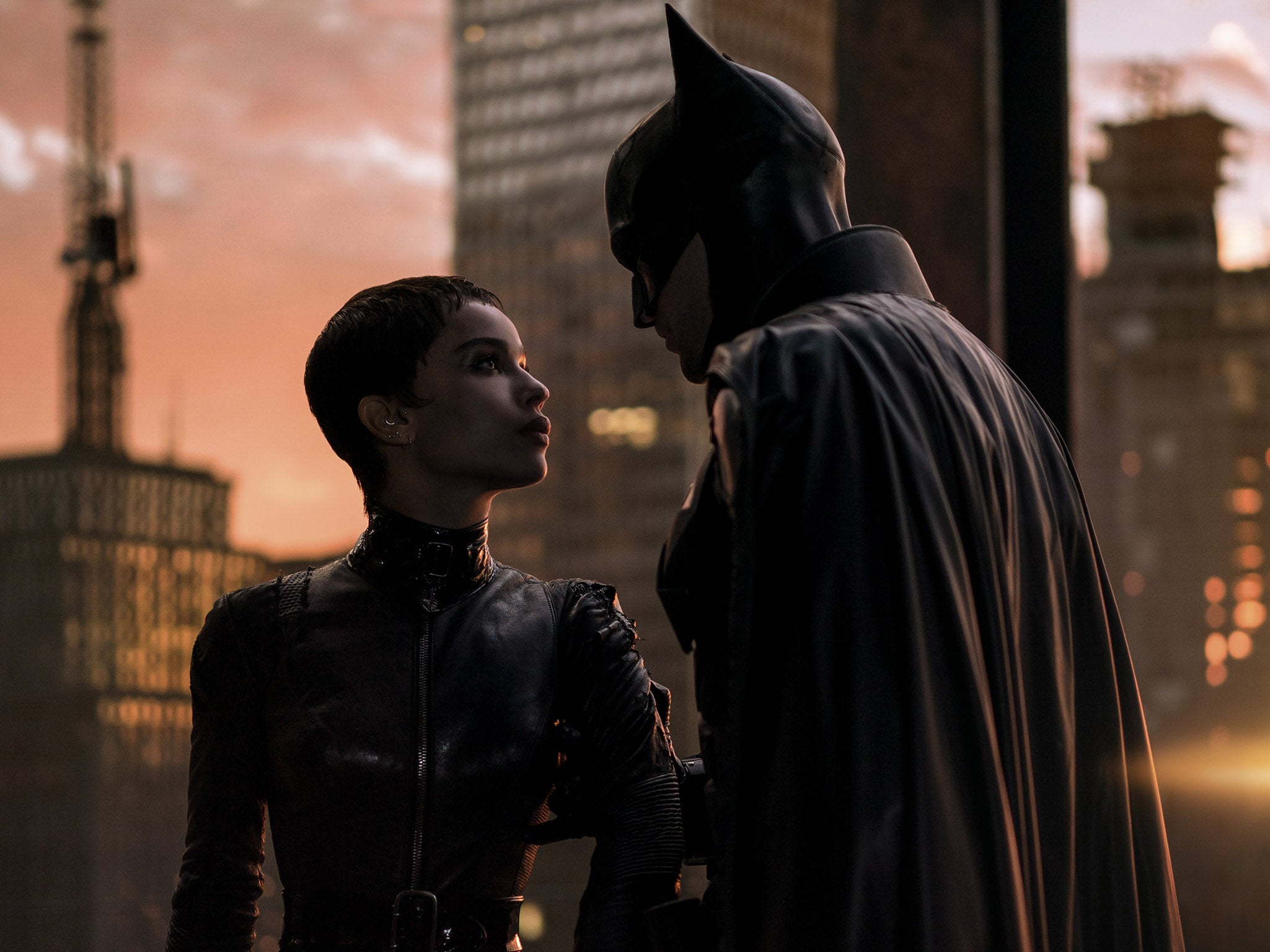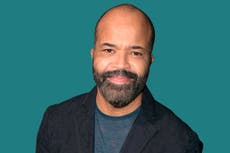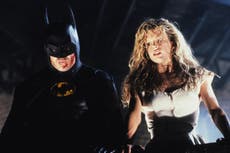The Batman review: Robert Pattinson goes emo in Matt Reeves’ detective noir
Matt Reeves’s take on the Caped Crusader may not be a genre-defining miracle, but it delivers a tapered-down, intimate portrait, while Zoe Kravitz’s Catwoman brings an almost-extinct sensuality to the role
Dir: Matt Reeves. Starring: Robert Pattinson, Zoe Kravitz, Paul Dano, Jeffrey Wright, John Turturro, Andy Serkis, Colin Farrell. 15, 176 minutes
In this world, nothing can be said to be certain, except death, taxes, and Batman. The Caped Crusader has been a cultural constant since his inception in 1939, acclimatising himself to the days of Sixties kitsch or post-9/11 cynicism, and now reintroducing himself through Robert Pattinson before his current iteration has even taken a final bow (Ben Affleck’s final appearance in the role is set for this year’s The Flash).
Joel Schumacher gave Val Kilmer and George Clooney nippled batsuits in the Nineties, Christopher Nolan’s trilogy gave him a philosophy, Zack Snyder gave him the urge to kill in 2016’s Batman v Superman. We’ve had platter after platter of Batmen served up with the promise that this, now this, will be the only Batman we ever need.
And here we are again, on another spin around DC Comics’s chiropteran merry-go-round. Matt Reeves is now in the driver’s seat, having successfully transformed the Planet of the Apes franchise into the stuff of modern epic. He’s spent much of The Batman’s press tour spouting comparisons to the American new wave of the Seventies and Martin Scorsese’s Taxi Driver – exactly as Todd Phillips did while promoting the now double Oscar winner Joker. But is this not just a little bit exhausting? Is it not perilous, too, for the hype machine to constantly insist that every new comic-book film is a radical, genre-defining miracle?
The Batman is a very good Batman film. To think of it as anything more only leads to delusion or disappointment. It also undermines the more subtle work at play in Reeves’s film, which remains faithful to the character’s core iconography – bat ears, elaborate gadgets, encroaching darkness – while simultaneously interrogating its usefulness. Comparatively, it’s pitched somewhere between Christopher Nolan and Tim Burton – with one foot in our reality, and the other planted in a Gothic noir aesthetic derived partially from Frank Miller’s The Dark Knight Returns and Batman: Year One comics.
Perhaps that’s where you’d place our new Batman, Pattinson, too – though his performance hasn’t been this tapered down since his Twilight days, stripped of the exhilarating chaos that infects his acting in Good Time or The Lighthouse. I can’t blame him. Anything outside the register of growly and monotone would be considered mutiny by fans, so it’s to be expected that he sounds almost exactly like Christian Bale did in Nolan’s widely admired Dark Knight trilogy of the early Noughties.
The curtain fringe Pattinson sports as Bruce Wayne, the man behind the cowl, at least allows us to differentiate his Batman as the “emo Batman”. And it swings magnificently when Bruce snaps at his butler Alfred (Andy Serkis) and tells him: “You’re not my father.”
But Reeves isn’t here to bore us with another origin story of dead parents and pearls scattered across a Gotham back alley. Finally, we’ve been delivered “the world’s greatest detective”, as the comics like to call him, in flesh and blood. Reeves hasn’t been shy about the fact that Paul Dano’s Riddler, one of Batman’s closest adversaries, is modelled directly on the real-life Zodiac Killer, who terrorised California in the Sixties and became the subject of one of David Fincher’s best films.
This Riddler slaughters the city’s officials while taunting the police with ciphers, badly lit videos shot in portrait mode, and, to justify the name, riddles. Reeves clearly saw Dano’s performance as a suspected child abductor in Denis Villeneuve’s Prisoners (2013) and said, “Yes, thank you, more of that.” No offence to Dano, but he does make an excellent serial killer, all twitchy and meek with a dark desperation.
Reeves’s script, co-written with Peter Craig, delves into homage in a way that’s both broader and more effective than Joker’s Scorsese fest. The streets of Gotham are slicked with the same kind of acid rain that pounded down on Blade Runner’s futuristic LA; John Turturro, as crime boss Carmine Falcone, seems barely cognisant that he’s in a comic-book movie. Colin Farrell is so unrecognisable as the Penguin, hidden under layers of latex and a glutinous mob accent, that you do start to wonder why they didn’t just hire a guy who… looks like that. There are a hundred character actors who can do the mob thing in their sleep, after all.

Zoe Kravitz’s Catwoman, meanwhile, is both reduced to the trope of film noir broad and elevated by it. She has a tendency to overstate the fact that she can “take care of herself” while also conveniently becoming quite helpless whenever Batman’s around – but Kravitz delivers the role with slinky, milk-sipping elegance, her every entrance telegraphed by the meow of Michael Giacchino’s strings. She brings a sensuality that feels otherwise extinct from the comic-book genre.
This is a Batman that, in many ways, feels more intimate than what we’re used to. Reeves’s version of a car chase is captured, not with cranes and helicopters, but with a claustrophobic POV pinned to the front wheels or the driver’s face, exquisitely and provocatively framed by cinematographer Greig Fraser. We see a Batman of the shadows, whose entrances are signalled only by the ominous tolling of the score or the clomp of his boots, but who also falls hard and will limp away, defeated.
Nolan’s trilogy, at times, seemed uncertain about how its rebuke of authoritarianism could sit side by side with a Batman heralded as the benevolent capitalist. Reeves’s Batman makes more sense: he’s a reclusive, traumatised man treated as a freak by the rest of society. And there’s a startling twist hidden within the folds of this noir narrative, one that rightfully probes the individualist politics of the vigilante figure.
The Batman didn’t need nearly three hours to tell what is, at heart, the relatively simple story of its hero’s moral awakening, but it’s a feat in itself that the film has its own voice and perspective, instead of coming across like the Frankensteined creation of every Bruce Wayne that came before. Should it follow through on its final-reel promise of a sequel? The Batman has risen – but it might be pushing its luck if it decides to return.
Join our commenting forum
Join thought-provoking conversations, follow other Independent readers and see their replies
Comments


Bookmark popover
Removed from bookmarks